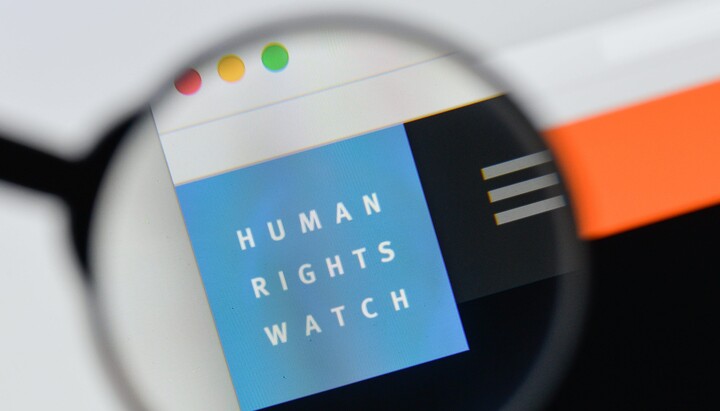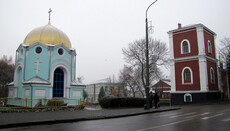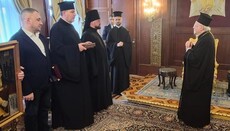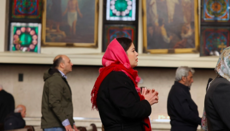U.S. advocacy organization Human Rights Watch criticizes law 3894

“The new law raises religious freedom concerns, and legitimate security concerns are not a green light to infringe on rights,” the report said.
The U.S. human rights organization Human Rights Watch criticized the new Ukrainian law (No. 3894) that could effectively ban communities of the Ukrainian Orthodox Church, the country's largest religious organization, as too broad and potentially having far-reaching consequences for Ukrainians' right to freedom of religion, the organization said on October 30.
Highlighting that "Ukrainian authorities understandably want to address state security concerns in the context of Russia’s brutal invasion of Ukraine," Hugh Williamson, Director for Europe and Central Asia at Human Rights Watch, emphasized that "the law interferes with the right to freedom of religion and is so broad that it could violate the rights of Ukrainian Orthodox Church members."
"The Ukrainian government should suspend implementation of the law and request the Venice Commission, the Council of Europe’s advisory body on constitutional matters, and the Organization for Security and Co-Operation in Europe’s’ Office for Democratic Institutions and Human Rights to provide expert analysis of the law that would be the basis for its rights-respecting revision," Human Rights Watch said.
The organization reminded that the Ukrainian Orthodox Church has repeatedly condemned Russia's war and, in May 2022, took steps to ensure its independence and full autonomy from the Russian Orthodox Church. However, in January 2023, Ukraine’s State Service for Ethnic Policy and Freedom of Conscience deemed these steps insufficient.
Human Rights Watch stated that Ukrainian authorities should address specific security-related cases, rather than effectively banning entire religious communities solely based on presumed ties to the Russian Orthodox Church.
"Broad implementation of the new law risks severe practical consequences for the Ukrainian Orthodox Church’s congregations and millions of parishioners," Human Rights Watch stated. "They range from restrictions on ownership and operation of religious properties to difficulties in accessing places of worship and heightened risk of security service surveillance and prosecution."
They pointed out that "any prosecution or penalty not based on specific, unlawful actions but solely on the adherence to a peaceful practice of faith, constitutes religious discrimination and is prohibited by international human rights law."
In a written response to Human Rights Watch’s questions sent on October 2, Ukraine's State Service for Ethnic Policy and Freedom of Conscience stated that Ukraine "does not demand that the Ukrainian Orthodox Church betray the doctrine of the Orthodox Church, change liturgical practices or language, switch to a different liturgical calendar, or join another church jurisdiction. The only requirement that the Law insists on is withdrawing from the Russian Orthodox Church, which is involved in the war against Ukraine."
The law considers any ties, not just institutional and organizational, but also canonical, with the Russian Orthodox Church to be grounds for banning it.
"Requiring the Ukrainian Orthodox Church to sever canonical ties may cast doubt on the legitimacy of its adherents’ religious beliefs, which the European Court of Human Rights has identified as a key element of the right to freedom of religion," said Human Rights Watch.
The organization cited the UN Human Rights Monitoring Mission in Ukraine, which recorded multiple incidents where groups of people forcibly entered churches of the Ukrainian Orthodox Church, "justifying their actions with decisions from local authorities to register new religious communities of the Orthodox Church of Ukraine at the same address as existing Ukrainian Orthodox Church communities."
U.S. human rights advocates emphasized that Ukraine is obligated under both Ukrainian and international law to guarantee religious freedom. This is enshrined in Article 9 of the European Convention on Human Rights, to which Ukraine is a party. The International Covenant on Civil and Political Rights, also ratified by Ukraine, guarantees the right to freedom of religion (Article 18) and provides that "no one shall be subject to coercion which would impair his freedom to have or to adopt a religion or belief of his choice." Governments are explicitly prohibited from derogating from, or partially suspending, the right to freedom of religion protected under the Covenant, even in times of public emergency.
Moreover, the European Court of Human Rights has ruled that government measures that are liable to have negative repercussions on the exercise of religious freedom by the adherents of a particular church or faith – such as banning or dissolving that church, "must be supported by evidence of specific acts liable to pose a threat to public order or to the interests of others"; "must avoid casting doubt on the legitimacy of the beliefs in question”; and “must remain proportionate."
"Ukrainian authorities are within their right to investigate and prosecute any individual, regardless of their religious affiliation, when there is credible evidence to indicate their specific actions are illegal and pose a threat to public safety and state security," Williamson stated. "However, religious affiliation on its own cannot be considered such evidence."
As the UOJ reported, the U.S. expressed concern over the UOC ban in Ukraine.











